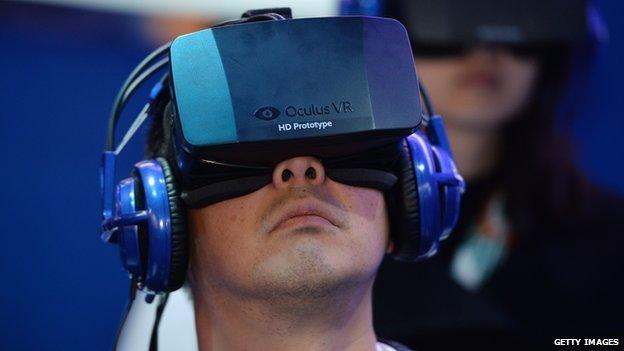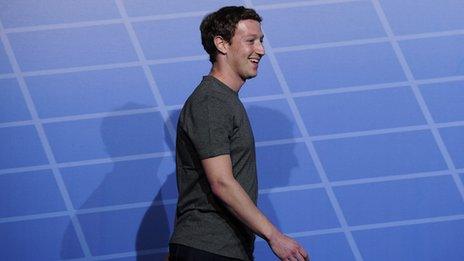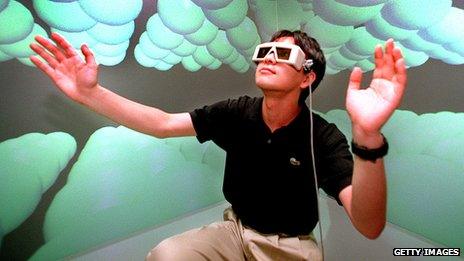Facebook buys the future
- Published
- comments

There was a swift reaction in my household to the news that Facebook is buying Oculus Rift, the start-up virtual reality gaming business.
"Why would they do that? They"ll ruin it," said my 15-year-old son, a keen gamer.
This is interesting for two reasons. Unlike most adults, he knows what Oculus Rift is, before it has even hit the market (the gaming forums he frequents are obsessed with it) and he has a deep distrust of Facebook. He's not alone. Markus Persson, creator of Minecraft, and revered as possibly the coolest man on earth by young gamers, took to his blog, external and to Twitter to condemn the deal: "@notch: We were in talks about maybe bringing a version of Minecraft to Oculus. I just cancelled that deal. Facebook creeps me out."
Why did Facebook spend $2bn on virtual reality? Rory Cellan-Jones reports.
So Facebook in just 10 years has gone from edgy bedroom start-up to corporate creep, at least in the eyes of some. One suspects Mark Zuckerberg won't be too worried. On a conference call last night to unveil the deal, he once again outlined his grandiose mission to connect the world and open our eyes to a better future.
He has faced criticism at every stage of his journey - first from crusty old social media sceptics, then from Facebook users outraged at any change, and now from young refuseniks wary of the power and wealth of his business. Each time, he has carried on regardless and mostly been proved right.

Mark Zuckerberg has faced criticism from many quarters
Now, just weeks after spending $19bn on WhatsApp, he's using Facebook's ever more valuable shares to buy another plaything. And while you can just about see the industrial logic of bringing a communications tool like WhatsApp into the fold - even if the price seems insane - it is much harder to see how virtual reality hardware fits in.
Maybe Zuckerberg, like many others of his age, watched 18 months ago as Oculus Rift hit its target on Kickstarter within hours, and thought "that's cool." The deal is certainly another vindication of the crowdfunding platform's ability to provide lift-off to innovative ideas that might otherwise struggle to be noticed.
Two billion dollars still seems a crazy amount to pay for something that's still more an idea than a business, but it does show that Facebook's founder - like his rivals at Google - is prepared to make big bets on the future of technology.

An earlier attempt at virtual reality, in 1998
Certainly, the more starry-eyed enthusiasts for Oculus Rift see it as having applications far beyond gaming, allowing us to enjoy virtual travel, to take virtual trips to virtual stores, creating entire worlds in which we can lose ourselves - or be shown adverts and spend money. The cynics remember the failed virtual reality experiments of the 1990s or virtual worlds like Second Life, and wonder whether VR will ever appeal to an audience beyond mostly male gamers.
So, just as Google has put robotics and artificial intelligence in the spotlight with its recent acquisitions, Facebook could now spark a rush to invest in virtual reality. Whatever the fears of his detractors, Mark Zuckerberg has shown he's an optimist about the power of this technology. From 2004 when he founded his company he has had a clear vision of what the future might look like - and so far, he has been proved right.